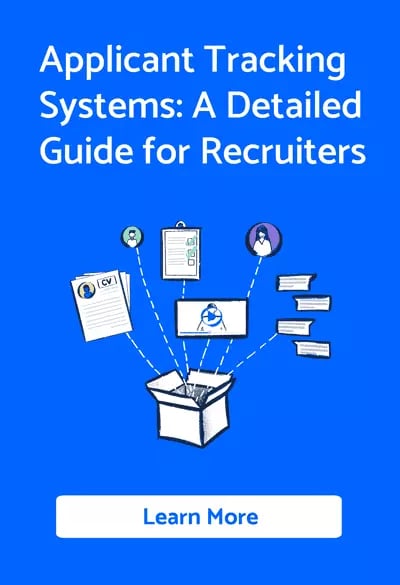Hiring the right talent is crucial to the success of any startup. However, it's common for startups to make costly mistakes in the recruitment process.
In fact, the US Small Business Administration estimates that 50% of small businesses fail within the first five years, with poor hiring decisions being a significant contributing factor.
In this article, we will explore startups' top hiring mistakes and discuss the potential financial implications of these missteps. We will use relevant data and research findings to highlight the importance of a well-structured hiring process for your startup's long-term success.
Ultimately, hiring is not straight forward for startups which can lead to problems when it comes to generating revenue growth. For example, 46% of startups struggle to find right fit candidates and founders can waste up to 40 hours a month hiring manually.
Getting hiring right for your startup is imperative.
Let's get into it...
1. High Cost of Relying on External Recruiters
While using external recruiters can help startups find qualified candidates, the cost of their services can quickly add up.
Recruiter fees typically range from 15% to 25% of the candidate's first-year salary, which can be a significant expense for cash-strapped startups.
Check out the hidden cost for startups using a recruiter.
Additionally, relying solely on external recruiters can limit your startup's ability to develop and refine its hiring processes and strategies.
Solution: Build an internal talent acquisition team or train existing employees in recruitment best practices to reduce the need for external recruiters. Utilise online resources and industry networks to develop your startup's recruitment capabilities, lowering costs and increasing your control over the hiring process.
2. Time-Consuming Manual Job Posting
Manually posting job openings on multiple job boards can be a time-consuming and repetitive task, taking valuable time away from other crucial business activities.
According to a 2021 study by Appcast, the average time spent posting a job across various platforms is approximately 1.5 hours.
In fact, manual job posting can have a signficant negative impact on your business.
This time can quickly accumulate, especially if your startup is hiring for multiple roles simultaneously.
Solution: Implement an applicant tracking system (ATS) or use job posting software that automates and streamlines the job posting process. By utilising technology that allows you to post job openings to multiple job boards simultaneously, you can save time and ensure that your job postings reach a broad audience of potential candidates.
3. Managing hiring with spreadsheets and email
Many startups still rely on spreadsheets and emails to manage their hiring processes.
While these tools may seem cost-effective, they can lead to hidden expenses that negatively impact your bottom line.
A study by Robert Half found that the average time spent reviewing a single resume is 23 minutes, most of which is spent sorting through emails and updating spreadsheets.
This time-consuming process can lead to inefficiencies and increase the risk of human error.
Using outdated tools can also contribute to a longer time-to-hire, with research by Capterra indicating that companies using manual methods take an average of 34 days to fill a position, compared to 23 days for companies using an applicant tracking system (ATS).
A longer hiring process may result in losing top talent to competitors and cause delays in reaching business objectives.
Furthermore, spreadsheets and emails need more advanced features and automation offered by modern hiring tools, which can lead to disjointed communication, misplaced information, and a less streamlined hiring process.
These inefficiencies can result in higher hiring costs, missed opportunities to secure top talent, and increased employee turnover.
Solution: Implement an applicant tracking system (ATS) or other modern hiring tools to streamline and automate your recruitment process.
By investing in up-to-date technology, you can save time, reduce the risk of human error, and improve your hiring efforts' overall efficiency and effectiveness.
This will help you attract and retain top talent while minimising the hidden costs of using outdated tools.
Useful resources:
- [£10.7billion] The Hidden Cost Of Using Spreadsheets & Emails To Hire People]
- How To Ditch Spreadsheets & Transform How You Hire [7 Key Strategies]
- 9 Reasons Why You Need To Use An ATS [Not Spreadsheets]
- How you can transition from a spreadsheet to an ATS
- GoHire vs Spreadsheets & Email [8 Key Benefits]
4. Hiring Too Quickly
The urgency to fill positions can lead startups to make better hiring decisions.
According to a study by Leadership IQ, 46% of new hires fail within the first 18 months, often due to rushed hiring processes.
Hiring decisions can cost startups time and money, with the US Department of Labor estimating that a good hire can cost 30% of the employee's first-year earnings.
Solution: Implement a structured hiring process with well-defined job descriptions, thorough interviews, and reference checks. This will help ensure that you find candidates who are skilled and a good fit for your startup's culture.
5. Ignoring Cultural Fit
While focusing on technical skills is important, paying attention to cultural fit can lead to high employee turnover.
A 2018 study found that 32% of new hires who quit within the first 90 days do so because of a lack of cultural fit.
High turnover rates can cost startups 1.5 to 2 times an employee's annual salary when factoring in recruitment, training, and lost productivity costs.
Solution: During the interview process, assess candidates for cultural fit by asking questions that explore their values, work style, and preferences. This will help you identify individuals more likely to thrive in your startup's unique environment.
6. Failing to Offer Competitive Compensation Packages
To save money, some startups may offer below-market salaries or limited benefits.
A 2020 Glassdoor survey found that 45% of employees cited salary as a primary reason for leaving a job.
Offering uncompetitive compensation packages can lead to higher employee turnover and difficulty attracting top talent.
Solution: Research market rates for your hiring roles and offer competitive salaries and benefits.
To entice top candidates, consider offering equity or other non-monetary perks, such as flexible work arrangements or professional development opportunities.
7. Overlooking Internal Talent
Startups often prioritise external hiring, overlooking the potential of their existing workforce.
According to LinkedIn's 2020 Global Talent Trends report, internal hires typically ramp up 50% faster than external hires and are 18% more likely to remain with the company after three years.
Focusing solely on external candidates can lead to increased hiring costs and missed opportunities for growth and development within your startup.
Solution: Before launching an external search, evaluate your current team members to identify potential internal candidates. This can help you save on hiring costs while fostering a culture of growth and development.
8. Neglecting Employer Branding
A strong employer brand is crucial for attracting top talent.
A 2021 Glassdoor survey found that 84% of job seekers consider a company's employer brand before applying.
Startups that invest in their employer brand may need help to attract the best candidates, leading to increased hiring costs and a less skilled workforce.
Solution: Invest in building and promoting your startup's employer brand by showcasing your company culture, values, and employee experiences. Leverage social media, your company website, and employee testimonials to create a compelling brand narrative that resonates with potential candidates.
9. Inadequate Onboarding Process
A disorganised and sufficient onboarding process can make new hires feel lost and supported.
According to a 2017 Gallup report, only 12% of employees strongly agree that their organisation does a great job onboarding new employees.
Poor onboarding can result in lower employee engagement, increased turnover, and reduced productivity, negatively impacting your startup's bottom line.
Solution: Develop a comprehensive onboarding program with clear role expectations, introductions to key team members, and ongoing support. This will help new hires integrate more quickly and effectively, increasing their likelihood of success and engagement with your startup.
10. Relying Solely on Traditional Hiring Methods
Startups that rely solely on traditional hiring methods, such as job boards and recruitment agencies, may miss out on diverse and untapped talent pools.
A 2019 Korn Ferry study found that companies with diverse workforces are 33% more likely to outperform their industry peers financially.
Solution: Diversify your recruitment efforts by utilising non-traditional channels, such as industry-specific forums, social media, and employee referrals. This will help you reach a broader range of candidates and foster a more inclusive and innovative startup culture.
11. Not Leveraging Data and Technology
You must utilise data and technology in your hiring process to avoid inefficiencies, increased hiring costs, and suboptimal decision-making.
A LinkedIn report found that 69% of talent acquisition leaders agree that data-driven recruitment is essential for success.
Solution: Implement modern hiring tools, such as applicant tracking systems (ATS), to streamline your recruitment process and harness data analytics to inform strategic hiring decisions. Leveraging technology will help you optimise your hiring process, save time, and reduce costs.
12. Overemphasising Hard Skills
While hard skills are undeniably important, overemphasising them at the expense of soft skills can lead to an imbalanced workforce.
A 2019 survey by LinkedIn found that 92% of talent professionals consider soft skills to be equally or more important than hard skills.
Employees lacking crucial soft skills, such as communication and adaptability, may need help collaborating effectively, adapting to new challenges, and contributing to a positive workplace culture.
Solution: Evaluate candidates not only for their technical expertise but also for their soft skills. Ask behavioural and situational interview questions to assess their problem-solving, communication, and teamwork abilities, ensuring a well-rounded and versatile workforce.
13. Failing to Provide Clear Growth Opportunities
A lack of growth opportunities can lead to employee dissatisfaction and turnover.
A 2020 LinkedIn Workplace Learning Report found that 94% of employees would stay at a company longer if it invested in their career development.
High turnover rates can be costly, particularly for startups with limited resources.
Solution: Offer clear growth and development opportunities, such as mentorship programs, professional development courses, and internal promotion paths. Investing in your employees' growth will create a more engaged and committed workforce, ultimately reducing turnover and related costs.
Wrapping up the 13 critical mistakes startups make when hiring people
Avoiding these common hiring mistakes can save your startup from costly consequences and ensure you bring on the best talent possible.
A 2016 study by the Society for Human Resource Management (SHRM) found that the average cost of a bad hire is estimated to be around $240,000, which can severely impact startups with limited resources.
By refining your recruitment process and leveraging modern tools, you can optimise your hiring strategies, reduce costs, and position your startup for long-term success.
Prioritising cultural fit, diversity, and employee growth will help you build a strong and engaged team ready to tackle the challenges of the ever-evolving startup landscape.
Investing in efficient recruitment practices and technologies will save you time and money and empower your startup to attract and retain top talent in a competitive job market, ultimately increasing your chances of success and longevity in the business world.




